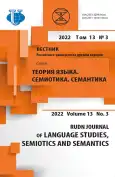The Image of Power Based on the Materials of the Crimean Associative Dictionary
- Authors: Ufimtseva N.V.1,2
-
Affiliations:
- Lomonosov Moscow State University
- Moscow Polytechnic University
- Issue: Vol 13, No 3 (2022)
- Pages: 630-647
- Section: COGNITIVE RESEARCH
- URL: https://journal-vniispk.ru/2313-2299/article/view/323482
- DOI: https://doi.org/10.22363/2313-2299-2022-13-3-630-647
- ID: 323482
Cite item
Full Text
Abstract
The study is devoted to the analysis of ideas about power in the language consciousness of three generations of representatives of the Russian culture (1994-2021). In course of the analysis, data from associative dictionaries and databases (RAS, EVRAS, SIBAS, Crimean Associative Dictionary), and sociological research materials are used. The theoretical basis of the study is the theory of language consciousness developed at the Moscow Psycholinguistic School. Culture is considered as a system of adaptive models, i.e. as the structure that brings together the society. The concept of POWER is one of the main dimensions of the social stratification of society. Even though the interest in the studying of this phenomenon in society, including in language, has increased significantly in recent years, most studies of this concept were carried out using traditional lexicographic sources and literary texts. In general, the degree of study of the concept (or in our terminology, the image of consciousness) POWER in the framework of the semanticcognitive approach seems to be insufficient. The approach from the standpoint of the Moscow Psycholinguistic School makes it possible to obtain data on the real content and structure of the language consciousness of a native speaker of the Russian language / culture, not only in its synchronous state, but also in temporal dynamics. The paper examines the structure of the core of language consciousness and the content of semantic gestalts of the images of consciousness of several generations of Russians. The analysis shows that the destruction of the archetypes of Russian culture, the growth of individualism is directly reflected in the structure of the core of language consciousness and its content.
Keywords
About the authors
Natalia V. Ufimtseva
Lomonosov Moscow State University; Moscow Polytechnic University
Author for correspondence.
Email: nufimtseva@yandex.ru
ORCID iD: 0000-0002-7476-8421
Dr. Sc. (Philology), Professor, Professor of the Department of General and Comparative Historical Linguistics of the Faculty of Philology of Moscow State University; Professor of the Department of Infocognitive Technologies of Moscow Polytechnic University
1-5, Leninskie Gory, Moscow, Russian Federation, 119991; 38, Bolshaya Semenovskaya str., Moscow, Russian Federation, 107023References
- Leontiev, A.A. (1993). Language consciousness and the image of the world. In: Language and Consciousness: Paradoxical Rationality. Moscow: Institute of Linguistics of the Russian Academy of Sciences. pp. 16–21. (In Russ.).
- Tarasov, E.F. (1996). Intercultural communication — a new ontology of the analysis of linguistic consciousness. In: Ethnocultural specificity of linguistic consciousness. Moscow: Institute of Linguistics of the Russian Academy of Sciences. pp. 7–22. (In Russ.).
- Isajeva, E.S. & Vasiljeva, E.G. (2021). Associative field of the concept “fire” in the linguistic consciousness of native Russian speakers at the background of the Latvian linguistic culture. Russian Language Studies, 19(3), 241–252. https://doi.org/10.22363/2618-8163-2021-19-3-241-252
- Tarasov, E.F. (2014). Prolegomena to the theory of linguistic consciousness. Questions of psycholinguistics, 4 (22), 24–35. (In Russ.).
- Filippovich, A.Yu. & Cherkasova, G.A. (2021). Man, state, power — associative base (Republic of Crimea), N.V. Ufimtseva & E.Ya. Titarenko (eds.). Moscow—Simferopol. (In Russ.).
- Lebedeva, N.M. (2000). Basic values of Russians at the turn of the XXI century. Psychological Journal, 21, 3, 73–87. (In Russ.).
- Schwartz, S.H. (1992). Universals in the structure and content of values: Theoretical advances and empirical tests in 20 countries. In: Advances in experimental social psychology, M.P. Zanna (Ed.). Vol. 25. Orlando, FL: Academic. pp. 1–65.
- Schwartz, S.H. (1994). Are there universal aspects in the structure and contents of human values? Journal of Social Issues, 50, 19–45.
- Lebedeva, N.M. & Pavelko, E.V. (1998). Research of cultural continuity among Russians at the present stage of development. Yearbook of the Russian Psychological Society, 4(1), 99–10. (In Russ.).
- Vendina, T.A. (2002). Medieval man in the mirror of the Old Slavic language. Moscow: Indrik. (In Russ.).
- Kasyanova, K. (1994). About the Russian national character. Moscow: Publishing House of the Institute of the National Model of the Economy. (In Russ.).
- Karaulov, Yu.N., Sorokin, Yu.S., Tarasov, E.F., Ufimtseva, N.V. & Cherkasova, G.A. (1994–1998). Russian Associative Dictionary. Vol. 1–6. Moscow: Institute of Rus. Language of the Russian Academy of Sciences. (In Russ.).
- The basic values of Russians (2003). Moscow: House of Intellectual Books. (In Russ.).
- Ufimtseva, N.V. & Cherkasova, G.A. (2018). Russian regional associative Dictionary EVRAS. Vol. I. From stimulus to reaction. Moscow: Moscow International Academy. (In Russ.).
- Shaposhnikova, I.V. & Romanenko, A.A. (2014). Russian regional associative dictionary of SEABASS. Vol. I. From stimulus to reaction. Moscow: Moscow International Academy. (In Russ.).
- Lisauskene, M.V. (2013). Young Siberians: life values and behavioral models of generation Z” (experience of youth research in the Irkutsk region in 1991, 2013, 2018). Siberian Society, 3(1), 46–60. https://doi.org/10.21684/2587-84842019-3-1-46-60 (In Russ.).
- Regional linguistic consciousness of Komi, Russians, Tatars: problems of mutual influence (2017). N.V., Ufimtseva, G.A. Cherkasova, O.V. Balyasnikova et al. (eds.). Moscow— Yaroslavl: Chancellor. (In Russ.).
- Shaposhnikova, I.V. (2020). Modes of identification of the Russian language personality in the era of change. Moscow: YASK. (In Russ.).
Supplementary files









